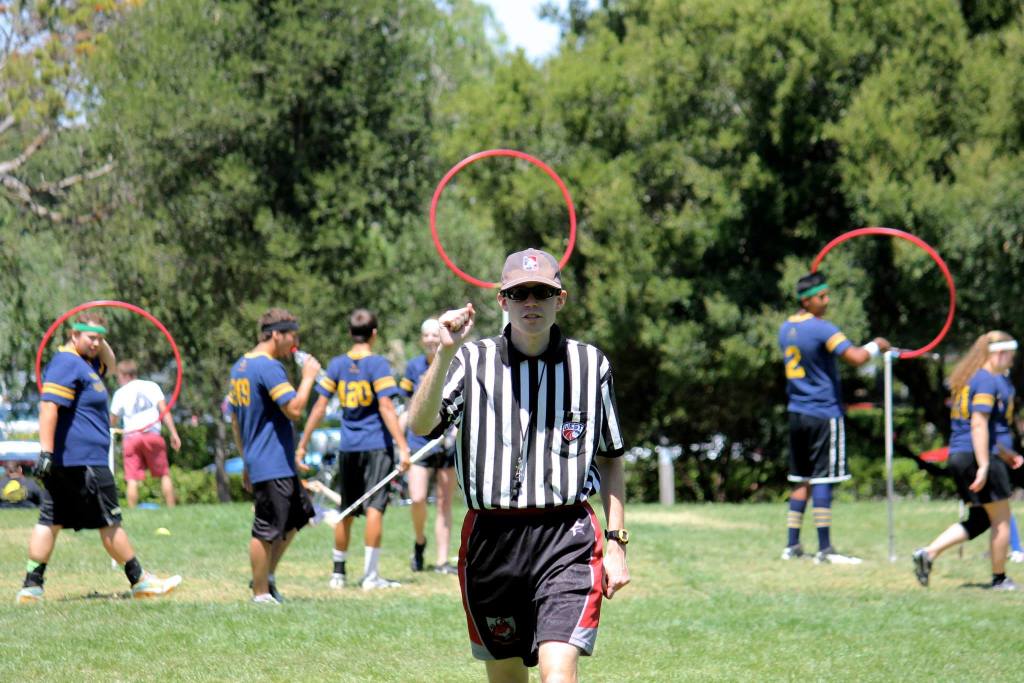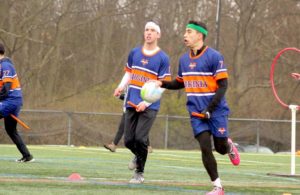- Rule, Britannia, no more?
- Unpopular Opinions: US Quadball Cup 2023
- Proven Contenders: University of Virginia
- Proven Contenders: Rutgers University
- Proven Contenders: University of Michigan
- Proven Contenders: Creighton University
- Different Perspectives: A Look Inside USA Ultimate
- Antwerp QC, Much of Belgian Core, Leaves Competitive Quidditch
Crisis of Confidence
We are now knee deep in the middle of the fall regional championship season. World Cup bids are being allotted; teams are playing for the future—not just the future of this season but in many cases the entire future of the program. Players and volunteers from all over are converging and putting on the best effort they can to ensure that the events are well run and that the continuing referee crisis does not cost a team a bid or a championship.
Yet, USQ has not addressed key issues related to this crisis.
The organization has, in recent months, seemed either unwilling or unable to deal with the problems surrounding our league’s referees, adding to the already extreme lack of confidence in USQ from its players and volunteers.
As USQ Rules Team Manager and the USQ Northeast Referee Advancement Coordinator, tasked with training and certifying referees, I feel that I personally cannot sit on the sidelines of these issues any longer. I hope that by explicitly pointing out several (though by no means all) of the issues we face, and a few of the possible ways to address those issues, both the USQ leadership and the players and volunteers will be able to come to some points of agreement and correct the course before things get truly out of hand.
Issue One
Mislaid requirement: The team-based referee requirements are inadequate and irrelevant to the issues at hand. We do have a severe lack of qualified, certified referees, and those referees are necessary in order to ensure that games are officiated well and that safety standards are followed. USQ has, however, taken this very real and severe issue and initiated a series of policies that both fail to address the actual needs of the community and also create a severe drain on the resources that should be going to fix the problems.
The current requirements are as follows:
- At least two team members must certify as assistant referees.
- At least one team member must certify as a snitch referee.
- At least one team member must pass the head referee written test.
- A different individual must fulfill each of these requirements.
These requirements somehow combine to create a perfect storm of inefficiency. We have too few referees. Those referees we do have are not highly qualified, and teams are pushed to meet expectations that are further and further from actually solving the problems.
Most importantly, none of the allocated requirements actually force teams to provide volunteers at any tournament. It is entirely possible (and in many cases likely) that the people who fulfill these requirements never actually serve as referees in a game situation. Additionally, by requiring a referee “membership,” the expectation is that the person who joins at this level would actually gain some benefit. However, since every team must have someone join at this level and since the demands and skills of actually performing as a referee are not something that everyone can fulfill successfully, this system sets up individuals for failure. Instead of freely choosing to enter a well-structured program, potential referees are either coerced by the team just to meet the requirement or are interested in refereeing but cannot get the attention they need to succeed because the limited resources are all being directed elsewhere.
We need to have a system in which to become a referee, each individual must reach and maintain a high standard. It must encourage people to join the program then work to reach that high standard. And, most of all, the program must encourage every person who becomes a referee to actually volunteer their time and talents during tournaments.
The current system fails on every account.
Issue Two
Misallocation of human resources: The issues above have been severely exacerbated by a complete misallocation of the limited resources that are available and would help to lessen the referee issue. The human resource of referee trainers has been severely reduced by a misguided policy that disallowed an entire group of dedicated and experienced volunteers—the members of the International Referee Development Program—from participating in the process of working to certify USQ referees.
The members of the USQ Referee Advancement Team have worked tirelessly in an attempt to make up for this decision, but the team has had to work from a deficit from the beginning and there has been neither the manpower nor the time to do an effective job. Every field test given by an RAC is given in a heightened state of awareness that there is a severe shortage of referees, which makes it ever more difficult for the members to uphold the standards that are necessary for referees in an ever more complicated and physical sport.
Additionally, many games this season would have been unofficial without the “conditional” certification of all head referees from last season that pass the 2014-15 written test. The evidence points to this policy having been both incredibly necessary and incredibly problematic.
The USQ referee training and certification system—which was still in its infancy and still had incredible strides to make—was essentially destroyed and re-instituted as a shell of itself. The RAC as currently constituted is simply not large or well-funded enough to create the resources necessary to do the job effectively.
Issue Three
Misallocation of finances: In order to fix the issues of referee certification, USQ needs to take a much more serious look at what constitutes a professional referee team. Each team pays approximately $25 for their referee “member.” At the very least, USQ should be ensuring that every dollar of that money is redirected into the referee program and that all the funds that have been collected in the name of the referee program are fully accounted. In addition, USQ should understand that the referee program requires an actual investment of human and fiscal resources. This issue has been exacerbated by the hiring of an officials manager who is in over his head due to the issues he has to face and who is not yet equipped to serve as an official or as a certifier himself.
In order to ensure that the certification and training of all referee members are done, USQ should develop a mutually-beneficial relationship with the IRDP. Then, once those teams have been able to take stock of the referees and potential candidates, USQ should develop a series of compensation policies that include the following:
- Allow for appropriate certification and payment of entire teams of fully-qualified referees at every tournament.
- Provide incentives for non-playing or team-affiliated referees to join the ranks.
- Provide resources for the most qualified referees to travel to and work at tournaments.
Quidditch is far beyond the days when the game could be refereed by an individual from one of the attending teams who happened to have read the rulebook. It is even beyond the point that one certified head referee and a team of players serving as assistants can do the job. To have a commitment to standardized gameplay and safety, these changes are essential and long overdue.
Issue Four
Miscommunication and misinformation: There is also a severe lack of communication between the various parties within USQ and, in turn, between those parties and the players. Immediately prior to the first regional championship, the USQ Teams Department and USQ Referee Department were both providing teams diametrically opposed information about the referee requirements for the upcoming regional.
This information had been misconstrued and filtered through various sources to the point that none of the official bodies could be sure of the proper information, and every attempt to get correct information was subject to a critical failure of urgency on the part of the people in positions of power. The issue was ultimately addressed, and in a fair and concise way, by pulling all of the relevant parties together for a conversation. The issue is that this conversation had to be pushed by a single volunteer and happened at a point long after teams had been misinformed and confused.
There are two clear ways USQ can address this issue:
- Ensure that all relevant parties are included in conversations about these topics and that there is a clear and well established chain of command if someone has questions.
- Create a comprehensive section of the USQ website that is specific and clear about the various policies (currently these policies are in no less than five separate sections of the website and are impossible to find without a direct search). This section should be fully vetted by the relevant parties and should be considered authoritative and absolute in answering any questions
The USQ leadership and the league’s members as a whole must address these issues now and with serious and concerted effort. These issues will not just go away. There are no other people out there to fight these battles. If the league is to get through this crisis, it is time to advocate for urgent action.




